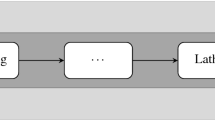Abstract
In numerous flow shop variants, the processing times of the operations are not fixed in advance, but may be distributed with some flexibility among the machines. In this paper, we introduce a general model which is expressive enough to cover several models from the literature. While in most cases it is \(\mathcal {NP}\)-hard to find a job permutation and a corresponding distribution of processing times minimizing the makespan, we show that for a fixed job permutation a best processing time distribution can be calculated in polynomial time by linear programming. Based on this, we propose a tabu search procedure using the set of all job permutations as search space. In a computational study, we show the power of the new model. Besides the classical permutation flow shop environment, we study variants with blocking, no-wait and synchronous movement constraints.

Similar content being viewed by others
References
Bolat A (1994) Sequencing jobs on an automobile assembly line: objectives and procedures. Int J Prod Res 32(5):1219–1236
Burdett RL, Kozan E (2001) Sequencing and scheduling in flowshops with task redistribution. J Oper Res Soc 52(12):1379–1389
Emmons H, Vairaktarakis G (2012) Flow shop scheduling: theoretical results, algorithms, and applications, vol 182. Springer, New York
Garey MR, Johnson DS, Sethi R (1976) The complexity of flowshop and jobshop scheduling. Math Oper Res 1(2):117–129
Gilmore PC, Gomory RE (1964) Sequencing a one state-variable machine: a solvable case of the traveling salesman problem. Oper Res 12(5):655–679
Graham RL, Lawler EL, Lenstra JK, Rinnooy Kan AHG (1979) Optimization and approximation in deterministic sequencing and scheduling: a survey. Ann Discrete Math 5(2):287–326
Gupta JND, Stafford EF (2006) Flowshop scheduling research after five decades. Eur J Oper Res 169:699–711
Gupta JND, Koulamas CP, Kyparisis GJ, Potts CN, Strusevich VA (2004) Scheduling three-operation jobs in a two-machine flow shop to minimize makespan. Ann Oper Res 129(1–4):171–185
Hall NG, Sriskandarajah C (1996) A survey of machine scheduling problems with blocking and no-wait in process. Oper Res 44(3):510–525
Huang K-L (2008) Flow shop scheduling with synchronous and asynchronous transportation times. Ph.D. thesis, The Pennsylvania State University
Janiak A (1988) General flow-shop scheduling with resource constraints. Int J Prod Res 26(6):1089–1103
Johnson SM (1954) Optimal two-and three-stage production schedules with setup times included. Nav Res Logist Q 1(1):61–68
Knust S, Shakhlevich NV, Waldherr S, Weiß C (2017) Shop scheduling problems with pliable jobs. Technical report, University of Osnabrück
Kouvelis P, Karabati S (1999) Cyclic scheduling in synchronous production lines. IIE Trans 31(8):709–719
Nawaz M, Enscore EE, Ham I (1983) A heuristic algorithm for the \(m\)-machine, \(n\)-job flow-shop sequencing problem. Omega 11(1):91–95
Néron E, Tercinet F, Eloudou Biloa A (2000) An exact method for a farming problem. In: Informs conference, San Antonio, Texas (USA)
Nowicki E, Zdrzałka S (1988) A two-machine flow shop scheduling problem with controllable job processing times. Eur J Oper Res 34(2):208–220
Nowicki E, Zdrzałka S (1990) A survey of results for sequencing problems with controllable processing times. Discrete Appl Math 26(2):271–287
Röck H (1984) The three-machine no-wait flow shop is NP-complete. J ACM 31(2):336–345
Shabtay D, Steiner G (2007) A survey of scheduling with controllable processing times. Discrete Appl Math 155(13):1643–1666
Soylu B, Kirca Ö, Azizoğlu M (2007) Flow shop-sequencing problem with synchronous transfers and makespan minimization. Int J Prod Res 45(15):3311–3331
Taillard E (1993) Benchmarks for basic scheduling problems. Eur J Oper Res 64(2):278–285
Waldherr S (2015) Scheduling of flow shops with synchronous movement. Ph.D. thesis, Department of Mathematics and Computer Science, University of Osnabrück
Waldherr S, Knust S (2015) Complexity results for flow shop problems with synchronous movement. Eur J Oper Res 242(1):34–44
Yenisey MM, Yagmahan B (2014) Multi-objective permutation flow shop scheduling problem: literature review, classification and current trends. Omega 45:119–135
Acknowledgements
This work was supported by the Deutsche Forschungsgemeinschaft, KN 512/7-1. The work of Stefan Waldherr was supported by the TUM Institute for Advanced Study through a Hans Fischer Senior Fellowship. The authors would like to thank two anonymous referees for their constructive comments.
Author information
Authors and Affiliations
Corresponding author
Rights and permissions
About this article
Cite this article
Bultmann, M., Knust, S. & Waldherr, S. Flow shop scheduling with flexible processing times. OR Spectrum 40, 809–829 (2018). https://doi.org/10.1007/s00291-018-0520-8
Received:
Accepted:
Published:
Issue Date:
DOI: https://doi.org/10.1007/s00291-018-0520-8




